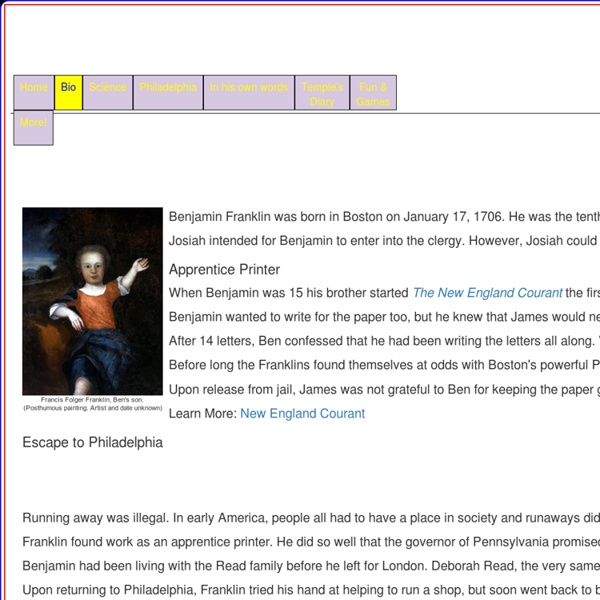Benjamin Franklin - Biography - Writer, Inventor, Scientist
Benjamin Franklin is best known as one of the Founding Fathers who drafted the Declaration of Independence and the Constitution of the United States. Synopsis Born in Boston in 1706, Benjamin Franklin organized the United States’ first lending library and volunteer fire department. Early Life Benjamin Franklin was born on January 17, 1706, in Boston in what was then known as the Massachusetts Bay Colony. Despite his success at the Boston Latin School, Ben was removed at 10 to work with his father at candle making, but dipping wax and cutting wicks didn’t fire his imagination. Franklin furthered his education in the printing trade in Philadelphia, lodging at the home of John Read in 1723, where he met and courted Read’s daughter Deborah. Franklin returned to Philadelphia in 1726 to find that Deborah Read had married. Prominent Citizen Franklin’s prominence and success grew during the 1730s, especially with the publication of Poor Richard’s Almanack at the end of 1732. Public Service Videos
Benjamin Franklin - American Revolution
In 1754, at a meeting of colonial representatives in Albany, New York, Franklin proposed a plan for uniting the colonies under a national congress. Although his Albany Plan was rejected, it helped lay the groundwork for the Articles of Confederation, which became the first constitution of the United States when ratified in 1781. In 1757, Franklin traveled to London as a representative of the Pennsylvania Assembly, to which he was elected in 1751. Over several years, he worked to settle a tax dispute and other issues involving descendants of William Penn (1644-1718), the owners of the colony of Pennsylvania. After a brief period back in the U.S., Franklin lived primarily in London until 1775. Franklin returned to Philadelphia in May 1775, shortly after the Revolutionary War (1775-83) had begun, and was selected to serve as a delegate to the Second Continental Congress, America’s governing body at the time.
The Autobiography of Benjamin Franklin
Benjamin Franklin was not only one of the Founding Fathers of the United States. He was a leading writer, publisher, inventor, diplomat, scientist, and philosopher. He is well-known for his experiments with electricity and lightning, and for publishing "Poor Richard's Almanac" and the Pennsylvania Gazette. A year after Benjamin Franklin's death, his autobiography, entitled "Memoires De La Vie Privee," was published in Paris in March of 1791. Known today as "The Autobiography of Benjamin Franklin," this classic piece of Americana was originally written for Franklin's son William, then the Governor of New Jersey. His work-- in effect the life of Benjamin Franklin-- portrays a fascinating picture of life in Philadelphia, as well as Franklin's shrewd observations on the literature, philosophy and religion of America's Colonial and Revolutionary periods.
Benjamin Franklin
Benjamin Franklin FRS (January 17, 1706 [O.S. January 6, 1705][1] – April 17, 1790) was one of the Founding Fathers of the United States. A renowned polymath, Franklin was a leading author, printer, political theorist, politician, postmaster, scientist, inventor, civic activist, statesman, and diplomat. Franklin earned the title of "The First American" for his early and indefatigable campaigning for colonial unity; as an author and spokesman in London for several colonies, then as the first United States Ambassador to France, he exemplified the emerging American nation.[3] Franklin was foundational in defining the American ethos as a marriage of the practical values of thrift, hard work, education, community spirit, self-governing institutions, and opposition to authoritarianism both political and religious, with the scientific and tolerant values of the Enlightenment. Early life in Boston Franklin's birthplace on Milk Street, Boston, Massachusetts Philadelphia Junto and library Freemason



